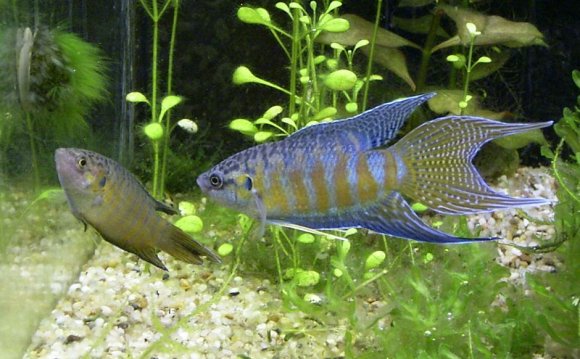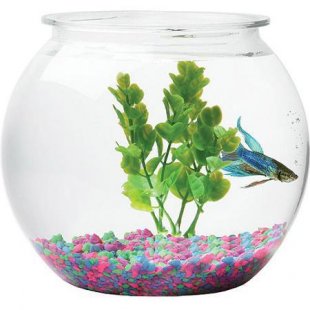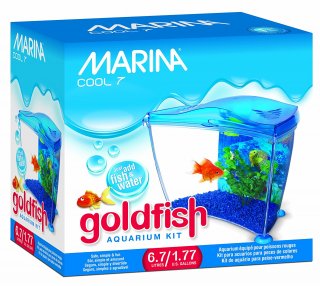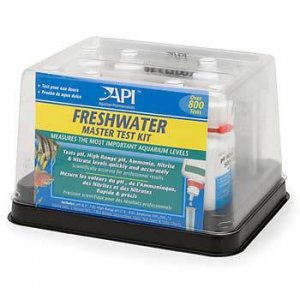
 Betta fish attract people to them with more than just their bright colors and feisty personalities—their inexpensive needs tend to be the largest contributor to their popularity. For families and individuals who cannot house a large animal, or afford the lengthy list of costs they come with, they often turn to fish as a cheap alternative. But—buyer beware!—fish are not as cost free as they appear.
Betta fish attract people to them with more than just their bright colors and feisty personalities—their inexpensive needs tend to be the largest contributor to their popularity. For families and individuals who cannot house a large animal, or afford the lengthy list of costs they come with, they often turn to fish as a cheap alternative. But—buyer beware!—fish are not as cost free as they appear.
In comparison to larger pet ownership, fishkeeping is inexpensive. There are no regular vet bills, no shots or immunizations, no professional grooming, no bulk food bags. Fish have very basic needs and little else. Inexpensive by comparison, however, is not the same as cheap. The truth is, there is no cheap living animal as most people think of cheap. First-timers involved with aquariums tend to have the clichéd image of a small bowl, water, and fish food being the extent of necessary expenditures, perhaps allowing imaginations run as far as adding a colorful plastic plant or humorous “No Fishing” sign into a pit of brightly colored rocks at the bottom of the plastic prison. This image, still pushed as it is by even the largest of retailers, is antiquated—or too outdated for its own good—at best. Not only is it a misleading picture of fish needs, it is actually a harmful and often deadly set up for pets.
Fish need love and care. The love and care that they require varies by species, as all fish are individuals with individual needs, but the same general rules of research apply to all living creatures before ownership. Betta fish tend to be victims of misinformation more so than their other aquatic brethren, perhaps an equal contender right up with goldfish as the most misunderstood—and abused—fish species available to the public. Because their needs often go misunderstood, many would-be owners tend to head into stores with little budget set aside for their scaly new pets. Some people turn away from a purchase when they realise how much money it actually costs to create a basic set-up for bettas, yet others still buy a fish with the dangerous bowl-water-food idea as all a fish needs to thrive. Many Betta fish die because of this simplification of their needs. Most of these deaths are often painful and avoidable.
 So how much does it cost, exactly, to own one of these beautiful creatures? Because there are many options in keeping a tank, it is best to keep a range of prices in mind when purchasing for the first time. It also helps to know what is essential to own for basic betta care that allows fish to thrive. Extras can enhance betta keeping but are exactly what they are: extras. Both basic needs and extras can be divided up into the following categories: equipment, water quality and maintenance, and food. Determining the true cost of owning a betta depends on your individual budget, ability to provide, and living circumstances, so this guide will be useful to calculate both minimum and maximum costs in betta ownership.
So how much does it cost, exactly, to own one of these beautiful creatures? Because there are many options in keeping a tank, it is best to keep a range of prices in mind when purchasing for the first time. It also helps to know what is essential to own for basic betta care that allows fish to thrive. Extras can enhance betta keeping but are exactly what they are: extras. Both basic needs and extras can be divided up into the following categories: equipment, water quality and maintenance, and food. Determining the true cost of owning a betta depends on your individual budget, ability to provide, and living circumstances, so this guide will be useful to calculate both minimum and maximum costs in betta ownership.
DISCLAIMER:
For the purpose of this article, costs are approximately calculated to account for one Betta fish in a tank with zero to a few plants in order to provide a basic idea of how much betta keeping costs. Prices are estimated and rounded to approximations using the listings provided by US Amazon.com listings at the time this article was written and they do not include shipping or handling fees. Depending on purchasing choices, including but not limited to, choice of store, brand selection, and location, prices may fluctuate. This article should be used as a guide only.
Equipment:
Tanks:
A tank is obviously a required item for betta ownership. Volume, shape, brand, and material are entirely customizable for owners and so costs can fluctuate greatly. Please note that Betta fish should NEVER be kept in a tank less than 1 gallon of water for normal pet ownership due to their basic needs. While professional breeders can keep their stock in smaller tanks, they also have round-the-clock care and specialized techniques that are impossible for regular pet owners to utilize, so anything less than a 1 gallon volume should not be considered and will not be listed here for the sake of humane treatment. To determine what tank size best suits your needs, learn about water conditions and the nitrogen cycle to see what best fits into your lifestyle. Additionally, some of these tanks come as a “complete set up” but such additional equipment is not usually betta friendly and you will most likely have to purchase additional equipment despite what products come with these tanks.
To determine what tank size best suits your needs, learn about water conditions and the nitrogen cycle to see what best fits into your lifestyle. Additionally, some of these tanks come as a “complete set up” but such additional equipment is not usually betta friendly and you will most likely have to purchase additional equipment despite what products come with these tanks.
1 Gallons:
Aquarius 1 gallon ($14)
Kritter Keeper 1.78 to 3 gallon ($14)
Marina Goldfish Starter Kit 1.77 gallons ($35) Note: Despite the name, this tank is not good for goldfish.
2 gallons:
3 gallons:
4 gallons:
5 gallons:
Aqueon Mini-Bow 5 5-gallons ($60) Product listing name is wrong. This is not a 2.5 gallon tank.
10 gallons:
Price breakdown for tanks:
Low: $10
High: $112
Heaters:
Heaters are 100% required for anyone who does not live in a tropical climate that maintains a steady water temperature between 78 degrees (F) and 80 degrees (F) during all hours of the day and night. Betta fish are a tropical fish species and their health greatly depends on their water conditions, temperature being a large player in what diseases and illnesses they are be vulnerable to. A light is not a replacement for a heater. A warm room is not a replacement for a heater. Not all heaters are created equally either, so for the purpose of this list only trusted, reliable, brands are listed. Please not the watts required for your tank size before purchase.
Price breakdown for heaters:
Low: $15
High: $38
Thermometers:
These are required so you can monitor tank temperature and make sure there are no large fluctuations in temperature. Important for treating diseases and illness, as well as for basic everyday care.
Price breakdown for thermometers:
Low: $5
High: $7
Filters:
Filters are not always needed, so this may or may not be a requirement for you. A filter does not clean a tank nor is it a replacement for water changes. Filters are used only to house beneficial bacteria during the nitrogen cycle, making water changes easier and overall tank health higher. It is not recommended to establish a cycle in a tank under 5 gallons for beginners and a cycle should never be established in a tank under 5 gallons with a live fish living in it until the cycle is complete. Learn more about the nitrogen cycle in this article and determine if a filter is right for you. Also note that tank size may determine what type of filter can be used and that filters not on this list may be betta unfriendly due to output and filter type.
Price breakdown for filters:
Low: $16
High: $33
Substrate:
Substrate is any sort of gravel, sand, or marble base to fill in the bottom of a tank. While this is not a required item, it does help with colonies of beneficial bacteria, holding down live and fake plants, and creating an appealing appearance.









